SI Vault: How the Celtics landed Kevin Garnett and became relevant again

Editor's note: This story originally appeared in the October 29, 2007 issue of SPORTS ILLUSTRATED. To subscribe, click here.
Paul Pierce slowly walked into the Celtics' locker room after another loss last March, head down, wondering how his career had taken such a wrong turn. The 29-year-old small forward was the lone All-Star on a roster of novices, five of whom were young enough to be in college; he was 10 pounds too heavy; and, worst of all, he feared that he would never accomplish anything of lasting value in the NBA, at least with Boston. "I had pretty strong thoughts that I wouldn't even be here this year," Pierce says now. "I was wondering what the plan was, and I was wondering if I was in the plan."
A new ownership group, which had taken control in September 2002, hired former Celtics guard Danny Ainge as executive director of basketball operations the following May, and over the next four years Ainge shrewdly drafted Al Jefferson, Delonte West, Tony Allen, Gerald Green, Ryan Gomes and Rajon Rondo without benefit of a lottery pick—only to undermine that strategy with questionable trades for Raef LaFrentz, Ricky Davis, Wally Szczerbiak and Sebastian Telfair. As Pierce was maturing into one of the NBA's finest all-around players (with career averages of 23.6 points, 6.5 rebounds, 3.9 assists and 1.66 steals), his supporting cast was growing progressively younger and becoming less supportive with each passing year.
The Celtics' 24—58 record last season was their worst in 10 years and included a franchise-record 18-game losing streak while a demoralized Pierce watched from the bench with a left foot injury. "We're going through 10, 11, 12 games in a row lost, 13," recalls Pierce, who missed the first 16 of those losses. "I was thinking, This team really has a future?"
• MORE NBA: Rubio Q&A | Teams with worst summers | 30 best contracts
Yet Ainge was not discouraged. Despite taking heat in Boston for his regular overhauls of the team, he felt he had accumulated enough assets to pull off a blockbuster trade. But even Ainge didn't imagine last March that he would swing two significant deals that have dramatically revived the championship hopes of a franchise that had won only three playoff series since Larry Bird's retirement in 1992.
By acquiring shooting guard Ray Allen from the Seattle SuperSonics and power forward Kevin Garnett from the Minnesota Timberwolves without relinquishing Pierce—forming an unparalleled trio of still-in-its prime NBA talent, with a cumulative 21 All-Star appearances and career scoring average of 65.6 points—Ainge made the Celtics relevant again.
*****
As both a Boston player and executive, Ainge has not been afraid of the risks involved in acting boldly. Back in 1988, when he was one of the Celtics' backcourt starters, he was seated at a table with Bird, forward Kevin McHale and team president Red Auerbach during the organization's Christmas party. At the time Boston was reportedly considering trades that would have sent Bird and McHale to the Indiana Pacers and Dallas Mavericks, respectively. "Look at these two guys," Ainge told Auerbach, over the surrounding conversations of other players and their families. "Larry's got casts on his feet [from surgery to remove bone spurs in both heels], Kevin's got a screw in his foot [to repair a stress fracture]—you've got to trade these guys." Everyone laughed at Ainge's typical audacity, but he wasn't joking. "I would have traded Larry Bird," he insists today.
Kevin Garnett: The Kid who changed the game (and the Timberwolves)
Fifteen years later Ainge sits in Auerbach's old chair. He was hired to set the franchise on a fresh course in search of Banner 17, as new managing partner Wyc Grousbeck referred to the NBA championship that had eluded the Celtics since they won 16 titles in a 30-year span through 1985—86. Within five months Ainge had completed his first major deal, sending All-Star forward Antoine Walker to Dallas for a package that included LaFrentz and thrusting leadership of the team upon Pierce.
But postseason appearances in 2004 and '05—plus an Atlantic Division title in '05, when Walker was reacquired for the stretch run—did not change the fact that Ainge was learning on the job. Many of Ainge's trades seemed to be attempts at rectifying earlier misjudgments. As he invested more and more in young players who were long-term projects, Boston slumped from 45 wins in 2004--05 to 33 to 24, missing the playoffs the last two years.
And yet, as the horrendous 2006—07 season wound down, Celtics fans were nonetheless enticed by hopes of landing one of the top two prospects in the draft, Ohio State center Greg Oden or Texas forward Kevin Durant, though Boston would enter the lottery with less than a 40% chance of winning one of the first two picks. Pierce was certain that either teenager would need years to mature into a player capable of turning the Celtics into an NBA champion, and that Pierce would be long gone by then. But the team's TV ratings in Boston increased during the 18-game losing streak, with fans perversely celebrating each loss as improving Boston's chances of landing Oden or Durant.
*****
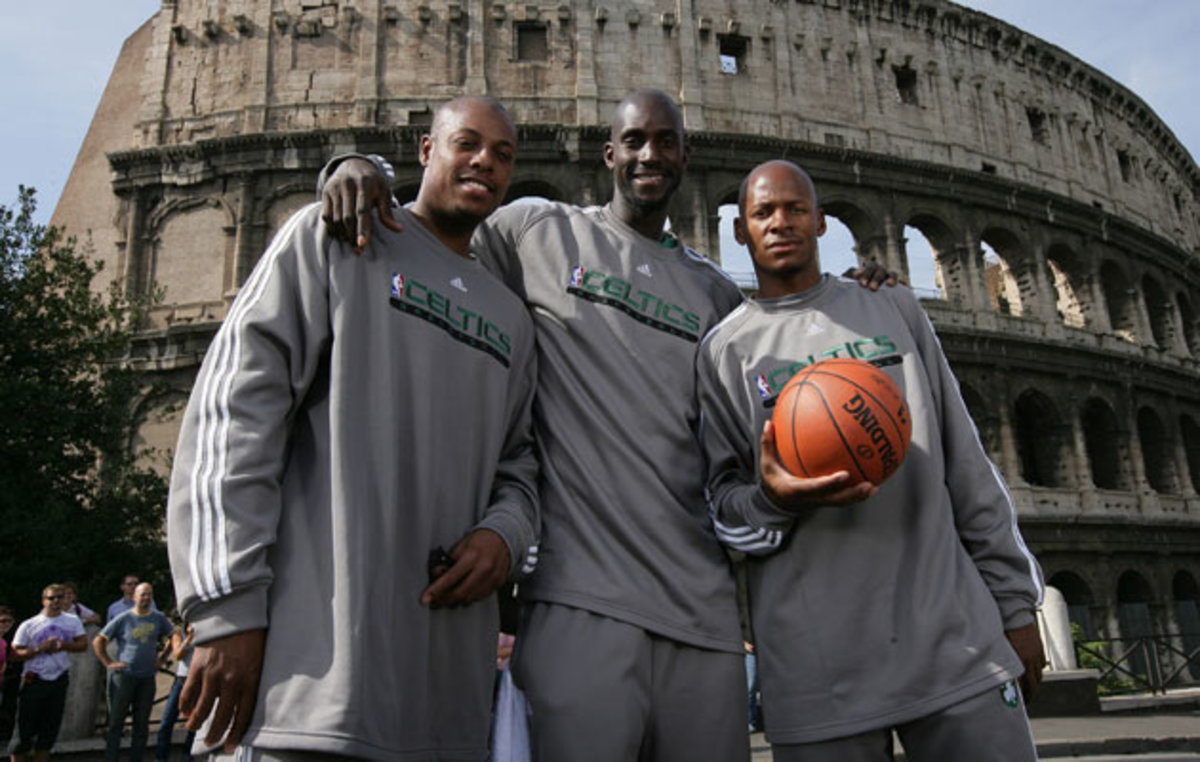
The Celtics’ lead owners, investment bankers Grousbeck and Steve Pagliuca, are longtime eastern Massachusetts residents and fans of the team their group bought five years ago for $360 million. Along with Ainge, they continually offered encouragement to Pierce, telling him that they shared his passion for winning in spite of the results. "I could see that Paul's spirit was kind of lost," says Ainge. "He wasn't the player that he could be, and I understood it."
Sensing his despair, the two owners and Ainge called Pierce to a meeting in Ainge's office at the team's practice facility in suburban Waltham last April to discuss the player's concerns. While he came away with a renewed belief that Grousbeck and Pagliuca were serious about providing him with veteran help, Pierce remained uncertain that Ainge could follow through. "I had mixed feelings about Danny," admits Pierce. "I didn't know if he could get us back to that [championship] level. What else am I supposed to think? I didn't know what he was trying to do, I didn't know the game plan."
It was apparent to Pierce that the Celtics were counting on rebuilding around Oden or Durant. "I saw the emergence of Al Jefferson and Tony Allen," says Pierce, "and I'm thinking, if they take either Oden or Durant, maybe it will be my time to go because they would have a great foundation." Whereas Pierce once feared being traded to a losing franchise—he vetoed an attempt by Boston in 2005 to move him to the Portland Trail Blazers for a draft pick the Celtics would have used on Wake Forest guard Chris Paul—he was now willing to start fresh almost anywhere: "I figured, How much worse could it get?"
*****
On May 22, the day of the lottery, Grousbeck, wearing a green-and-white pinstriped suit, anxiously approached Room 3A at NBA Entertainment studios in Secaucus, N.J. He would serve as the Celtics' representative for the lottery, which was to take place 90 minutes before the ESPN telecast revealing the results. Each of the teams' reps had to turn in his cell phone and other wireless devices after entering the room and were forbidden from communicating with the outside world.
Shortly after 7:30 p.m. balls numbered 1 through 14 were dropped into a tumbler at the front of the room. Grousbeck sat back in his chair, a list of 1,000 possible four-number combinations—-including the 199 assigned to Boston for having the NBA's second-worst record—upon his lap. When the balls 5, 9, 14 and 13 popped out for the No. 1 pick, Grousbeck didn't bother to review his list. Nor did he do so after 14, 4, 11 and 10 came up for pick No. 2. "I knew [our] numbers," he told reporters in the room. "A 1 or 2 had to show up or we weren't getting a pick, and they didn't show up."
As the telecast began, a brief camera shot of the gathering in Room 3A provided an unfortunate clue to Celtics president Rich Gotham. "I could tell by the way [Grousbeck] was sitting that we didn't get it," says Gotham, who was watching with Ainge and coach Doc Rivers in Ainge's office. "I could read the body language."
Boston ended up with the No. 5 pick, which meant the choice would be shopped. Perhaps the only person in Boston who was happy with this result was Pierce. Ainge would have more work to do.
******
Ainge and McHale have been friends for more than 25 years. They first met when Ainge, the reigning Wooden Award winner from BYU, joined the Celtics in November 1981 (Ainge had played four seasons in the Toronto Blue Jays' system before Auerbach bought out his baseball contract); McHale was in his second year in the NBA. They remained friends after Ainge was traded to the Sacramento Kings in '89. From there Ainge would play for the Trail Blazers and the Phoenix Suns, retire in '95 and work for TNT and serve as Suns coach before returning to Boston. McHale finished his career with the Celtics in '93, then became the Timberwolves' vice president of basketball operations two years later. "There are really no secrets between Kevin and I," Ainge says. "Kevin and I don't play games, we don't try to trick each other. We've known each other way too long to ever do that."
From the Vault: Remembering Kevin Garnett's first stint in Minnesota
Ainge had been trying to pry Garnett from Minnesota since late in the 2005—06 season, when the Timberwolves were wrapping up a disappointing 33-win campaign that launched speculation of Garnett's exit. Ainge routinely worked Garnett's name into his conversations with McHale and stubbornly kept it up even after McHale said Garnett wasn't available. But the rapport between the two friends and team execs was of secondary importance; far more crucial to Garnett's future was McHale's failure to maintain a winning combination around the 6'11" All-Star. After eight successive playoff appearances ending in 2004, Minnesota slumped to 44, 33 and 32 wins over the next three seasons. The franchise became vulnerable to losing Garnett because he could opt out of his contract after the 2007—08 season, and owner Glen Taylor wasn't interested in extending Garnett's deal unless he accepted a cut in his $20 million annual salary.
As it became clear that the Timberwolves might, indeed, part with Garnett, Boston emerged as a possible destination because it had a lottery pick; center Theo Ratliff's large contract that had only one year left; and, most attractive of all, Jefferson, an emerging 22-year-old power forward with the rare low-post and rebounding skills that McHale coveted. A week before the June 28 draft, however, Garnett's agent, Andy Miller, vetoed a potential trade to the Celtics by publicly declaring that Garnett had no interest in either leaving the Twin Cities or in signing an extension with Boston. Over the next few days the Suns and the Los Angeles Lakers became the front-runners in the bidding for the Big Ticket.
Though Ainge was still trying to salvage a deal for Garnett up to the eve of the draft, he was also looking elsewhere. A proposed three-team trade that would have sent Suns forward Shawn Marion to Boston and Garnett to Phoenix crumbled quickly, and another rumored deal for Marcus Camby of the Denver Nuggets didn't have legs either. As draft day approached it appeared as if Ainge might have to use that No. 5 pick after all. He had targeted Chinese forward Yi Jianlian, whom Ainge rated as the player with the most upside in this draft, but the last thing the Celtics needed was another phenom who was two or three years away.
*****
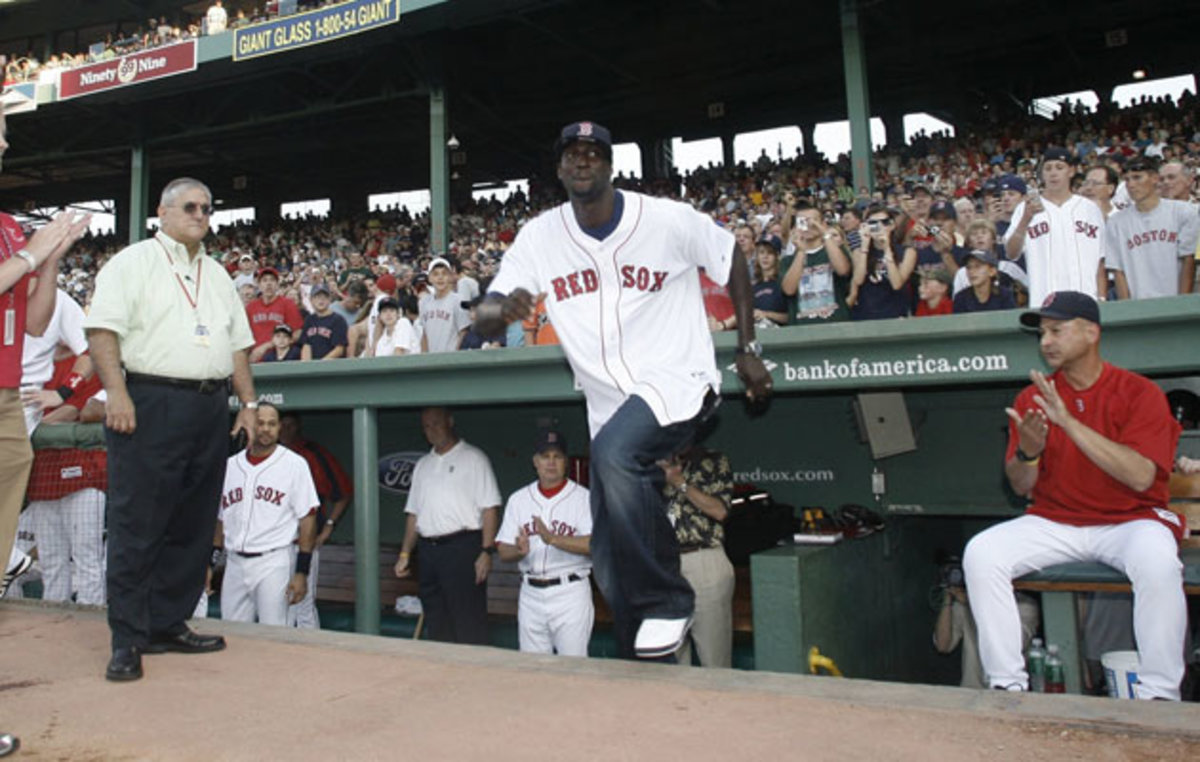
On the morning of the draft, in the midst of making and taking scores of calls at the team's Waltham offices, Ainge found an apparent trading partner: Sam Presti, the Sonics' new general manager, who told Ainge that he was willing to move Allen, with the three years and $52 million remaining on his contract, in exchange for young talent and cap flexibility—needs similar to those of the Timberwolves. While his staff quickly ran a background check to verify Allen's health (he had had surgery in April to remove bone spurs in both ankles), Ainge hit a wall in his negotiations with Presti: The Seattle G.M. said he wouldn't consummate the deal without including Rondo. "I was never going to do that," says Ainge, who values the athleticism, defense and potential leadership of his second-year point guard.
Several hours later—late afternoon on the East Coast—Presti reopened the door. In place of Rondo, he agreed to take West, a tough, sharpshooting combo guard, plus the already agreed upon No. 5 pick and Szczerbiak, who would provide scoring in the short term and cap space when his contract expired in 2009. The Celtics got Allen and a second-round pick, which they would use that night to take LSU forward Glen (Big Baby) Davis.
Initial reaction to the trade was far from complimentary to Boston. Frank Hughes of The News Tribune in Tacoma, Wash., made a lap of the reporters at the draft and wrote, "The general consensus was that the 30-year-old Presti fleeced Celtics general manager Danny Ainge, [who was] trying desperately to hold onto his and coach Doc Rivers's jobs."
The response was quite different within the Celtics family, and no one was happier than Pierce. "Danny had been asking me about Ray, Shawn Marion and a few other guys and what I thought of them," says Pierce. "I thought Ray was a better fit because he's a prototype two-guard and I can go play the three." But as team officials celebrated the arrival of Allen, who had a career 21.5 scoring average and the purest jump shot in the league, Rivers and other staffers figured there was no more hope of acquiring Garnett. Ainge felt otherwise: He had held fast to Jefferson and Ratliff as well as a conditional No. 1 pick from Minnesota (acquired in a 2006 trade) as chips to use in a long-shot bid to get Garnett.
******
In the days following the draft, Garnett, who had been steadfast in wanting to finish his career in Minnesota, learned of Taylor's intention to rebuild with a younger, cheaper roster. "The weekend after the draft is when he started to say, 'O.K., let's explore what the situation is,'" says Miller. Suitors quickly fell by the wayside: Garnett soured on the Lakers because of Kobe Bryant's trade demands, and another potential deal involving the Suns collapsed. Other interested teams, such as the Mavericks and the Golden State Warriors, weren't offering the package of youth, size, cap flexibility and draft picks that Ainge was willing to put up.
Roundup: 2015 NBA free agent grades
And Garnett was growing more intrigued with the Celtics. First, he had never played with teammates as talented as Pierce and Allen, with whom he could instantly contend for the Eastern Conference championship. Second, he had a friendship with Allen dating back to their high school days in South Carolina. "I didn't speak publicly, really didn't say too much to my friends or any of that," says Garnett. "But I really tried to be comfortable with seeing myself in a Celtics jersey."
He had no idea how Pierce felt about it, however. Garnett has an off-season home in Malibu, and before the draft—amid widespread reports of his possible trade to Boston—he had run into Pierce in a pickup game at UCLA, where Pierce, an L.A. native, is a regular. Yet Pierce had nothing to say to KG about their potentially becoming teammates. "He didn't even bring it up," says Garnett, confused by Pierce's seeming lack of enthusiasm.
The truth was, Pierce did not give any credence to the rumors, having been let down too many times by talk of everyone from Baron Davis to Allen Iverson coming to his rescue in Boston. So he rolled his eyes at the buzz about Garnett joining the Celtics. "I just thought there was no possible way," says Pierce, "and left it at that."
******
On July 5, Ainge and McHale reconnected at the NBA Summer League in Las Vegas. Ainge continued to pepper McHale with proposals for Garnett, and McHale continued to listen. "Kevin never played his hand [as if to say], This is something we're really interested in," says Ainge, "but he never gave me reason to lose hope."
For more than three weeks Ainge and McHale talked off and on—as many as five conversations on some days, having in-house deliberation on others—as McHale tried to squeeze the maximum out of the deal. The framework was settled quickly: Jefferson and Ratliff were mainstays, Ainge was willing to return the conditional No. 1 pick plus another, and Green, a swingman with 20-point potential, and Gomes, a second-year forward who played like a veteran, were in play.
DeAndre Jordan saga won't change NBA free agency moratorium rules
By this time Garnett was willing to consider a contract extension with the Celtics. So on July 20, with Minnesota's permission, Ainge flew to California for a one-on-one in Garnett's Malibu backyard. During the 90-minute conversation they discussed how KG would fit in with the Celtics and worked out the general terms of his salary: combining the two years remaining on his current contract (enhanced by a 15% trade kicker) and a three-year, $56 million extension, Garnett would earn a total of $104.9 million over the next five seasons in Boston. "It was probably the most simple negotiation I've been through," says Garnett.
Others would disagree, including Miller, who was besieged by the technicalities of the first sign-and-trade extension in NBA history. On the eve of the deal, he says, "I went out and walked [an] entire golf course screaming and venting because I was having so much difficulty."
Satisfied with Garnett's willingness to be a Celtic, Ainge flew home more optimistic about making the trade than ever. Eight days later he and McHale finally settled on the particulars of the biggest trade for one player in NBA history: In exchange for Garnett, Boston would send Jefferson, Ratliff, Green, Gomes, Telfair, two first-round picks and cash to Minnesota, which would rebuild around Jefferson, second-year guard Randy Foye and rookie forward Corey Brewer, its first-round pick from Florida.
That afternoon Grousbeck was jogging on the beach near his summer home on Martha's Vineyard when his phone rang. It was the last of his five calls that day with Taylor, and Grousbeck, says a league source, would agree to pay $1 million of Telfair's salary as compensation for not including Rondo in the deal. "This was the first trade we've done where owners were involved," says Grousbeck. "This was just too big for both franchises. I took my phone with me in case it rang, and it did ring and thank God."
*****
On July 31, at TD Banknorth Garden, Garnett stretched himself out of an SUV wearing an open-necked shirt, a blazer and a Red Sox cap. He had arrived in Boston that morning for meetings with the Celtics, a physical at New England Baptist Hospital and the beginning of the most promising phase of his career. (After the trade was announced the team enjoyed its most profitable day of ticket sales in years.) That evening, at Garnett's introductory press conference, the turnout was reminiscent of the day Bird announced his retirement 15 years earlier; the potential heirs to the original Big Three of Bird, McHale and Robert Parish had finally been found.
Boston is banking on the two trades turning into the most triumphant off-season makeover since the Lakers' in 1996. That summer L.A. acquired the rights to first-round pick Kobe Bryant in a draft-day deal and then signed free agent Shaquille O'Neal a few weeks later, an arranged marriage of superstars that produced three championships before an ugly divorce. Though it is paying $58.5 million to Allen, Garnett and Pierce this season alone—more than the entire payrolls of four NBA teams—Boston would gladly accept a similar scenario. "In this league if you really want to make something happen, you can," says Trail Blazers forward James Jones. "It's just that teams normally don't have the motivation to pull something off like the Celtics did."
Yet obvious questions will require months, maybe years, to answer. For instance, Are the new Big Three too old to win a championship? That's a fair concern because no NBA team has ever won a title with its top three scorers all in their 30s. Ainge contends that their style of play and body types will enable Allen, 32, Garnett, 31, and Pierce, 30, to remain productive for the lengths of their contracts. Still, the Celtics will be trying to break new ground with old legs. "We already know that the way to beat Boston is to run them," says Washington Wizards guard Gilbert Arenas. "Look at how old they are—we have to run them so that by the fourth quarter they have nothing left."
But in another way the three Boston elders have never felt younger. Eager to step up their learning curve, they met throughout September for daily workouts at the Celtics' practice facility. They will not be easing their way into November, especially with their arena almost guaranteed to be sold-out all season. "Kevin will pull those guys together quickly," says Timberwolves assistant G.M. Fred Hoiberg, who played with Garnett in Minnesota. "He's the best practice player I've been around in my career, and to see how hard he works, that brings together the team. I think they're the favorites to win the East."
After the Celtics gave up all those players, what about their depth? Ainge filled out the bench by signing veteran free agents Eddie House, Scot Pollard and James Posey to short-term, short-money contracts. Once the Celtics acquired Garnett, all three found Boston a more desirable destination and were willing to sign deals favorable to the team. Those contracts pushed Boston into luxury-tax territory, but the owners spend little time worrying about the enormous investment they've made. "If we don't get Banner 17 and do it in the right way, then we'll consider it a failure," says Grousbeck, who sees his ownership group as presiding over a public trust. "This isn't about the value of the team or selling out the building. It's about the Celtics on the court winning the championship and off the court leading the league in community relations and community work."
Other issues will be harder to quantify. Will Rivers prove able to coach defense as well as he oversees the offensive end of the court? (To that end he brought in defensive specialist Tom Thibodeau, the longtime aide to Jeff Van Gundy.) Will 21-year-old Rondo and 22-year-old center Kendrick Perkins develop into capable starters for a championship contender? Most important, will Allen, Garnett and Pierce be capable of dialing back their customary roles to flourish as a unit? "I can understand one of those guys being able to take the number 2 seat," says a Western Conference G.M. "But who's going to take the number 3 seat? There's no room for three [stars] unless at least one of them says, 'I don't care.' If one of them can do that, then they'll be great."
Some of these answers won't arrive until the looming heat of May and June, months when the old Boston Garden used to steam up and Auerbach was said to have glued the windows shut in the visitors' locker room. But the best sign of how far the Celtics have already come is that Pierce can see things from management's view. "They were new," Pierce says of Ainge and the owners. "They were learning the business, still learning how to operate the day-to-day. They took their time, sat back, evaluated everything for a few years and then it was the right time. They made the move. This is the most excited I've been about playing a season. I know this type of opportunity doesn't come around for a lot of players. We've got to make the most of it."
In the meantime Ainge will keep returning to the best memory he has of his extended efforts to restore the Celtics tradition. "Paul came and gave me a big hug the day we made the KG trade," says Ainge. "He said, 'Never did I think you could bring me these kind of veteran players.' That was probably my favorite moment of the whole thing, to see Paul like a little kid again."
GALLERY: Rare photos of Kevin Garnett over the years
Rare Photos of Kevin Garnett
Kevin Garnett
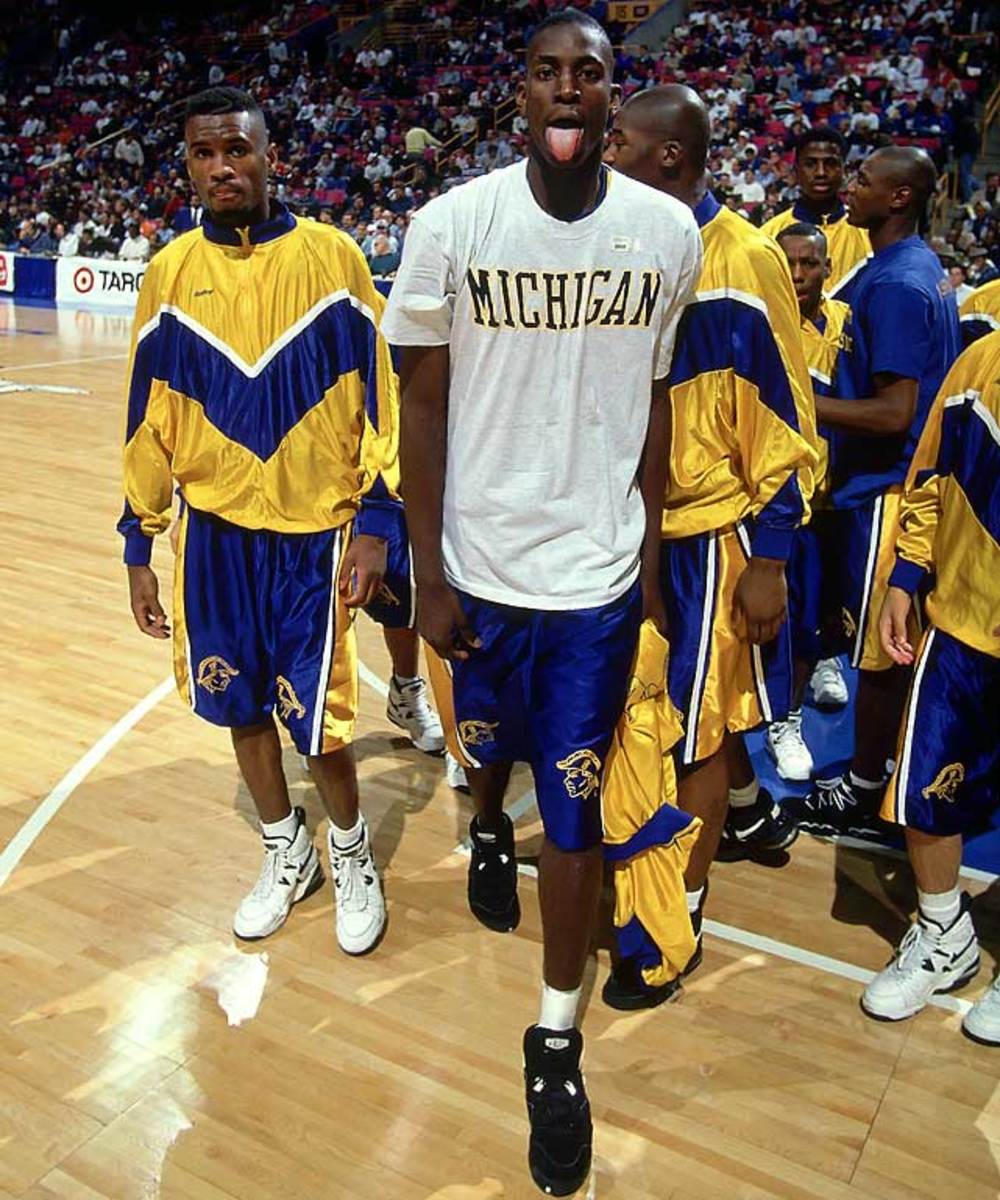
KG starred at Farragut Career Academy in Chicago, where he led the squad to a 28-2 record his senior season and earned National High School Player of the Year honors. Though the T-shirt may indicate he had dreams of playing in Ann Arbor, he instead chose to enter the NBA straight out of high school.
Kevin Garnett

Garnett poses outside of Farragut Career Academy. KG played for Mauldin High in South Carolina for his first three seasons but transferred to Farragut before his senior year.
Kevin Garnett

Garnett was named Mr. Basketball for Illinois after averaging 25 points, 18 rebounds, 7 assists and 7 blocks his senior season at Farragut.
Kevin Garnett and William Nelson
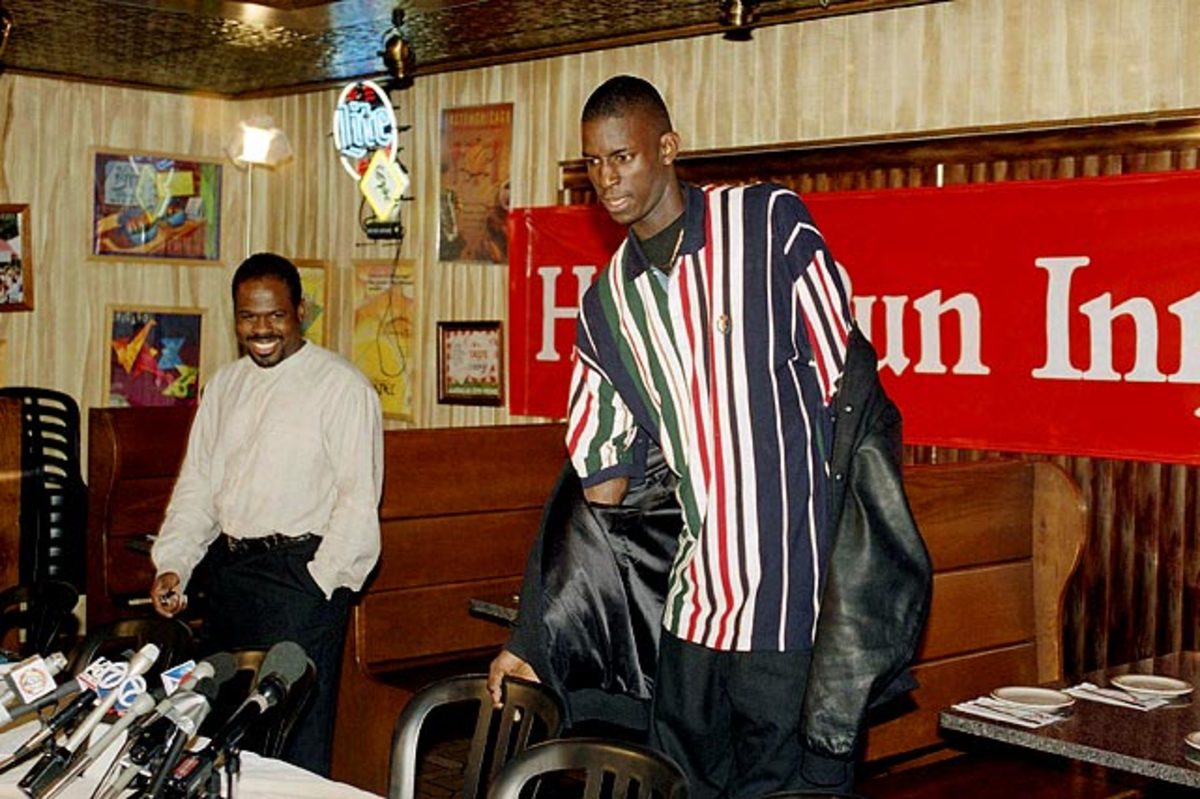
Garnett and his Farragut Academy coach, William Nelson, arrive at a news conference to announce Garnett's intention of skipping college to jump directly to the NBA.
Kevin Garnett

Garnett became only the fourth player to jump directly from high school to the NBA, following Moses Malone, Darryl Dawkins and Bill Willoughby.
Kevin Garnett

Garnett was drafted by the Minnesota Timberwolves with the fifth pick of the 1995 NBA Draft. KG was joined in the Top 5 by Joe Smith, Antonio McDyess, Jerry Stackhouse and Rasheed Wallace.
Stephon Marbury and Kevin Garnett
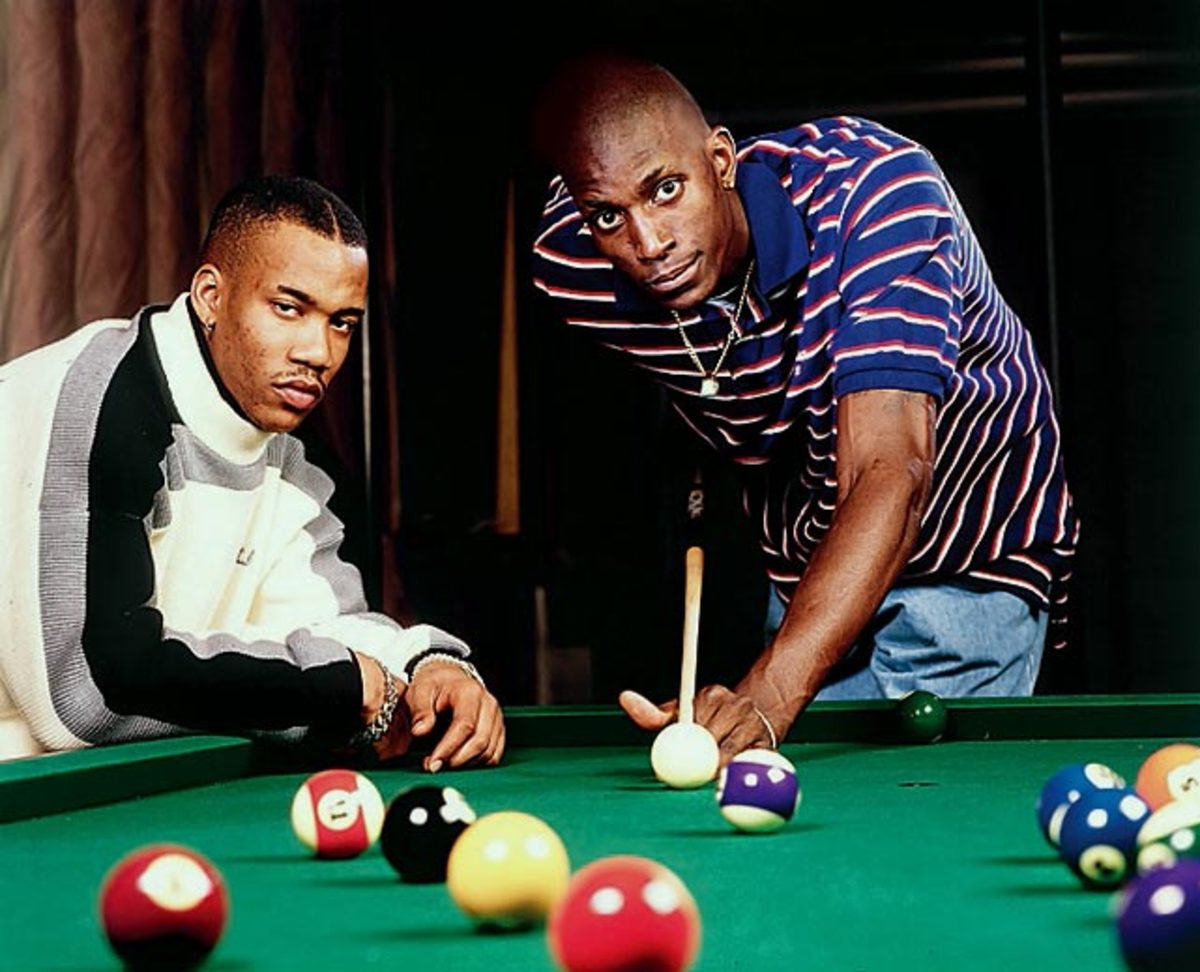
Garnett was joined the next year by Stephon Marbury and the two were expected to be the future of the organization. After leading Minnesota to the playoffs in 1997 and 1998, Marbury was traded to New Jersey after a dispute with management.
Kevin Garnett

Garnett's entourage -- called the OBF (Official Block Family) -- includes friends from Beachwood Drive in his hometown of Mauldin, S.C.
Vince Carter and Kevin Garnett
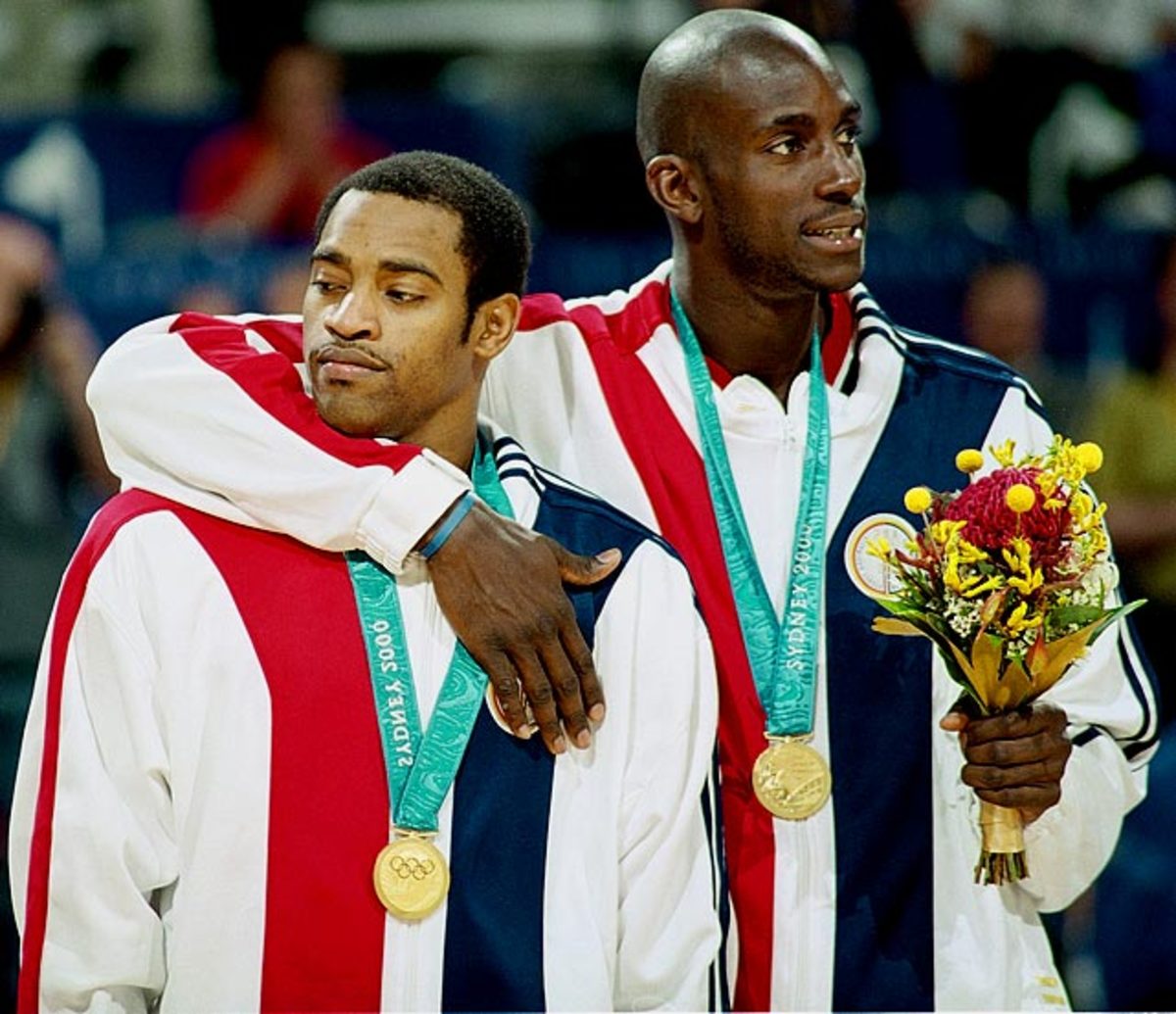
Garnett puts his arm around Vince Carter after leading Team USA to the gold medal in Sydney.
Kevin Garnett and Darius Miles
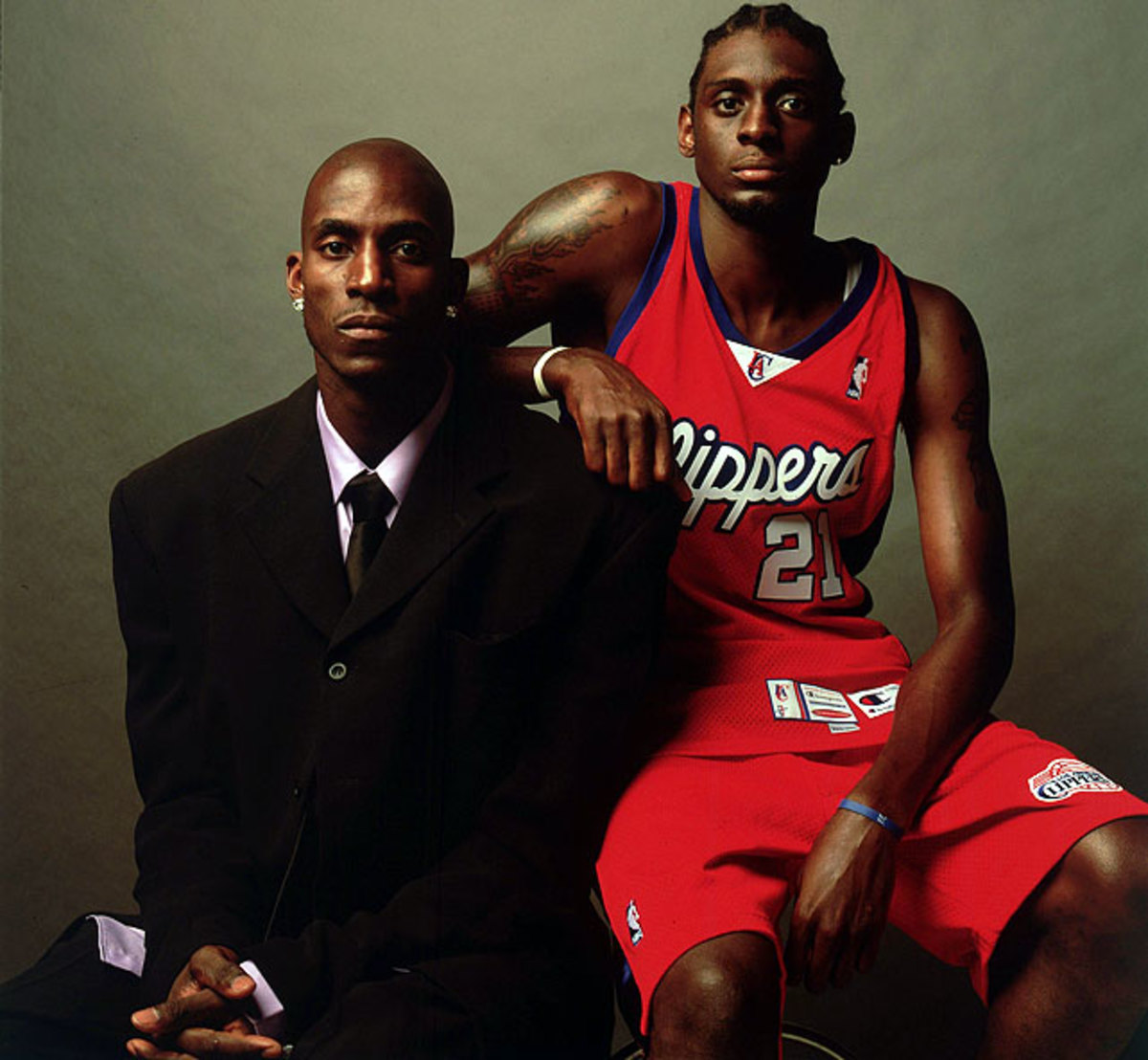
In 2000, high school star Darius Miles skipped college for the NBA and immediately drew comparisons to Garnett for their style of play. Those comparisons proved to be incorrect as Miles played nine injury-plagued seasons and is now out of the league.
Kevin Garnett and Japanese students
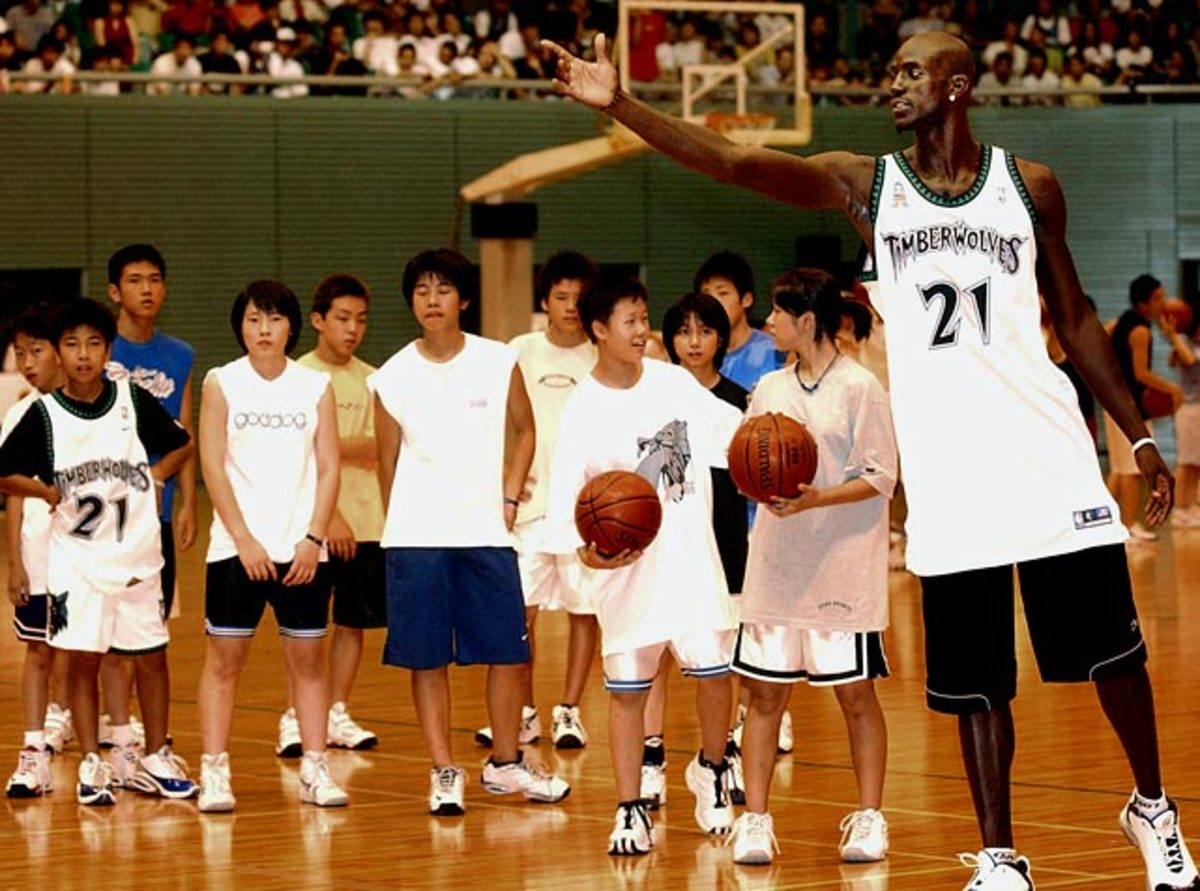
Garnett shows his skills during an NBA clinic in Tokyo.
Latrell Sprewell, Kevin Garnett, and Sam Cassell
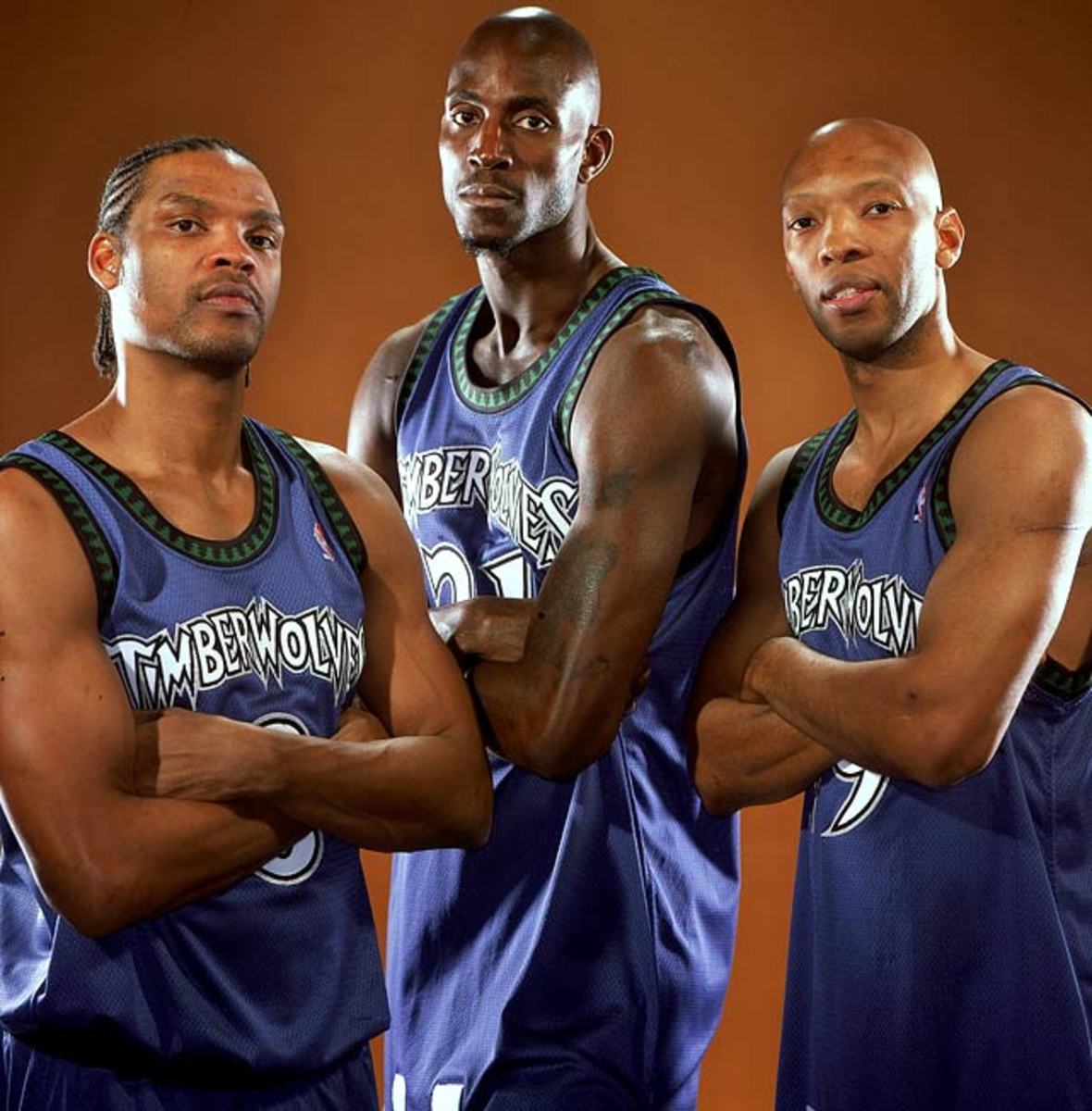
After years of first-round playoff exits, Garnett was joined by Latrell Sprewell and Sam Cassell for the 2003-04 season. KG was named NBA MVP after averaging 21 points, 12 rebounds and 5 assists. The Timberwolves advanced to the Western Conference Finals before bowing out to the Lakers.
Kevin Garnett

Garnett travels to New Delhi to debut his limited edition 'Adidas KG basketball shoe.'
Kevin Garnett and Serena Williams
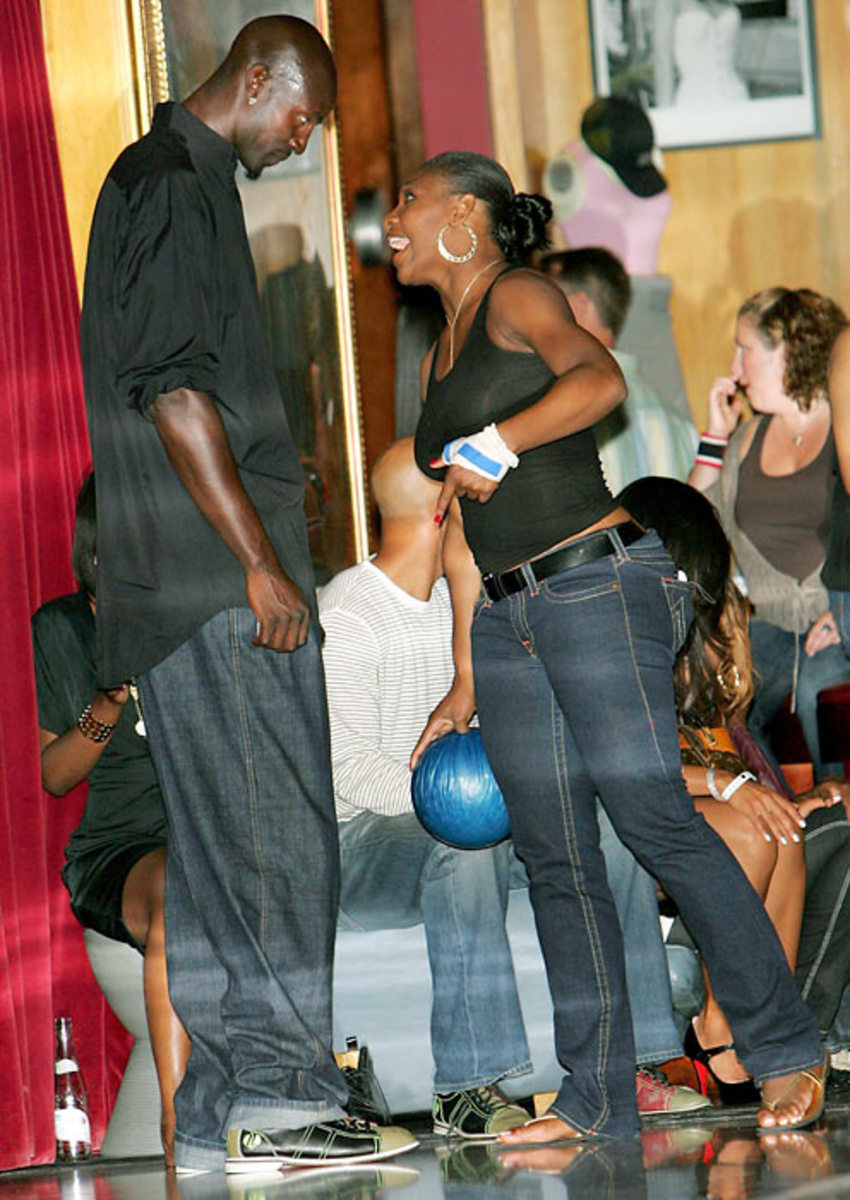
Garnett offers words of encouragement to Serena Williams at the Matt Leinart First Annual Celebrity Bowling Night in Hollywood.
Kevin Garnett and Barry Bonds
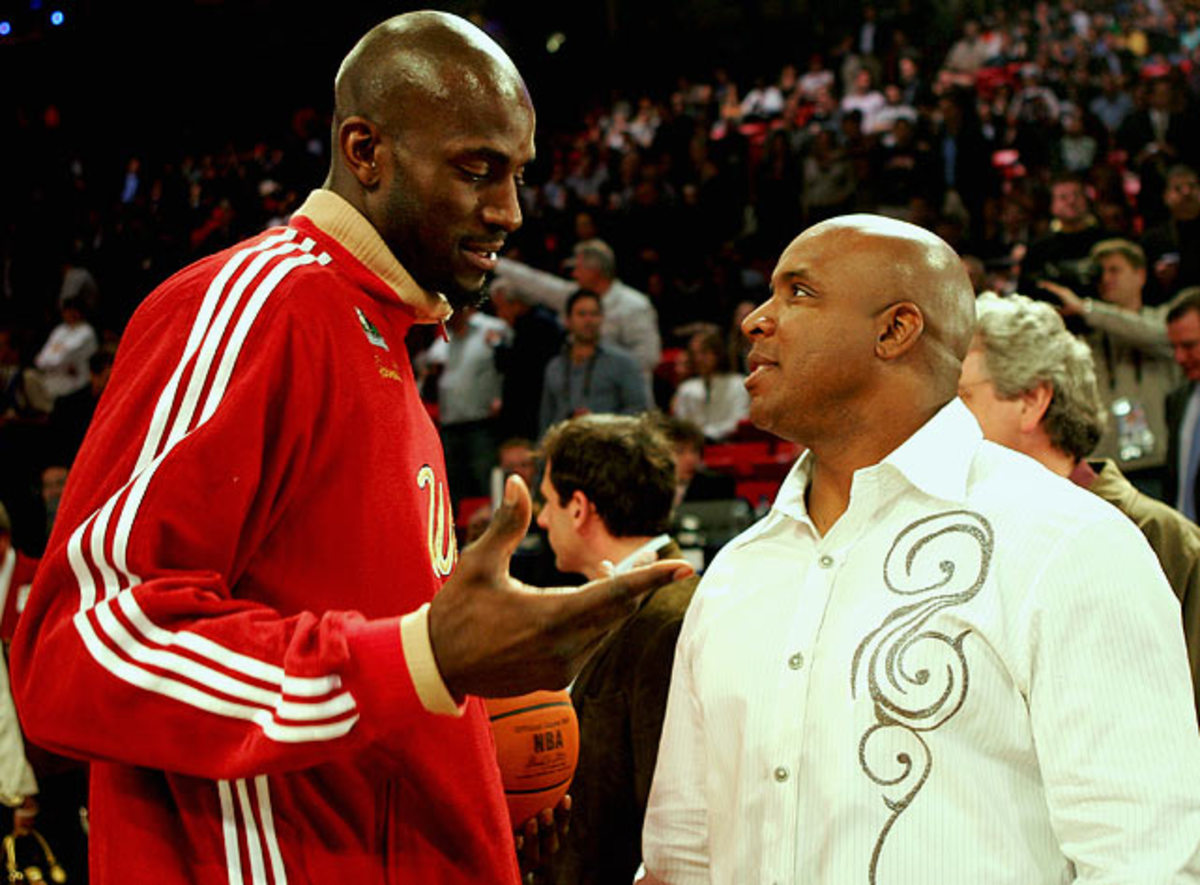
Garnett chats with Barry Bonds before the 2007 All-Star game in Las Vegas.
Kevin Garnett and David Ortiz
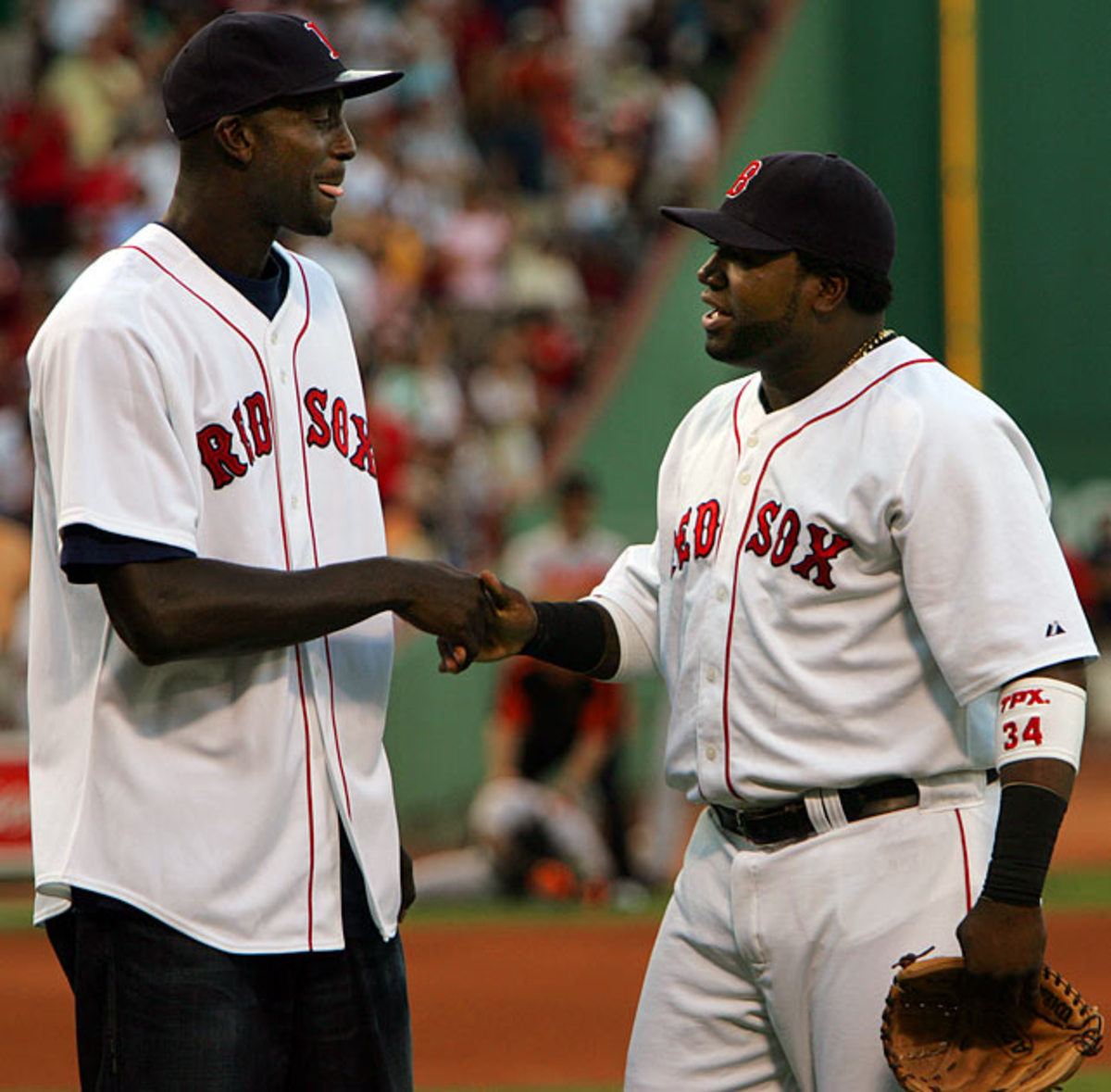
A day after being traded to the Celtics, Kevin Garnett reconnected with his old Minnesota buddy David Ortiz after throwing out the first pitch at Fenway Park.
Ray Allen, Kevin Garnett, and Paul Pierce
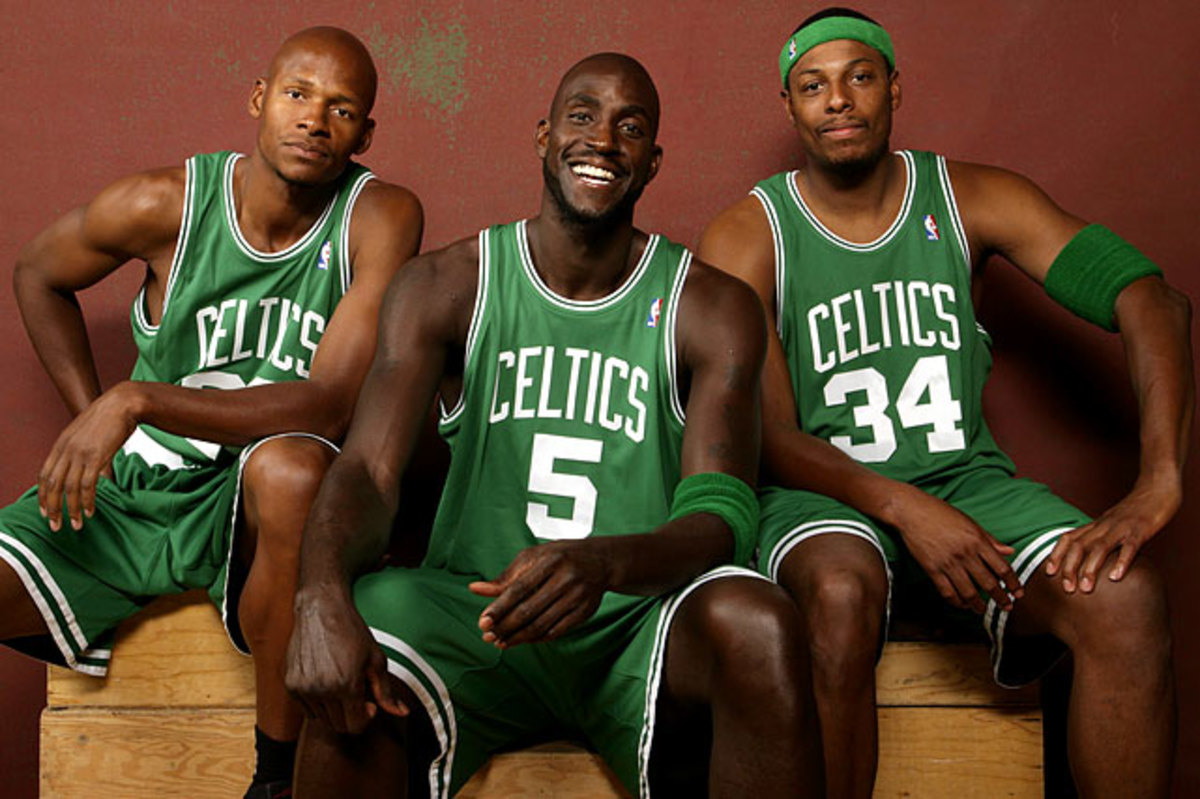
After the trade, Garnett, Ray Allen and Paul Pierce were immediately dubbed "The New Big Three" in Boston and became one of the favorites to win the 2008 NBA title.
Kevin and Brandi Garnett
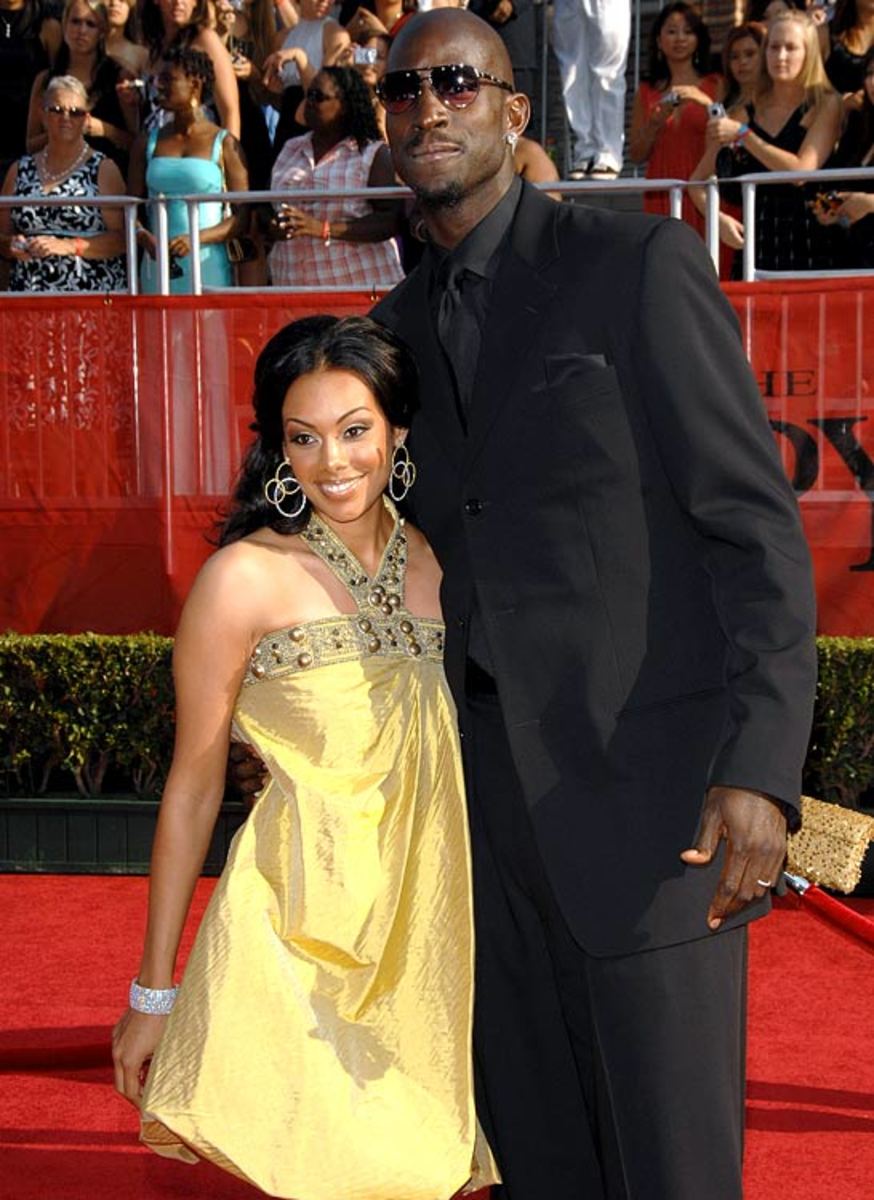
Garnett poses with his wife, Brandi. The couple married in 2004, which forced KG to miss a chance to defend the gold medal in Athens.
Kevin Garnett

A 15-time All-Star, Garnett finally won his first and only championship in 2008 with the Boston Celtics.
Kevin Garnett

Garnett averaged 20.4 points per game and 10.5 rebounds per game during the 2008 playoffs.
George W. Bush and the Celtics
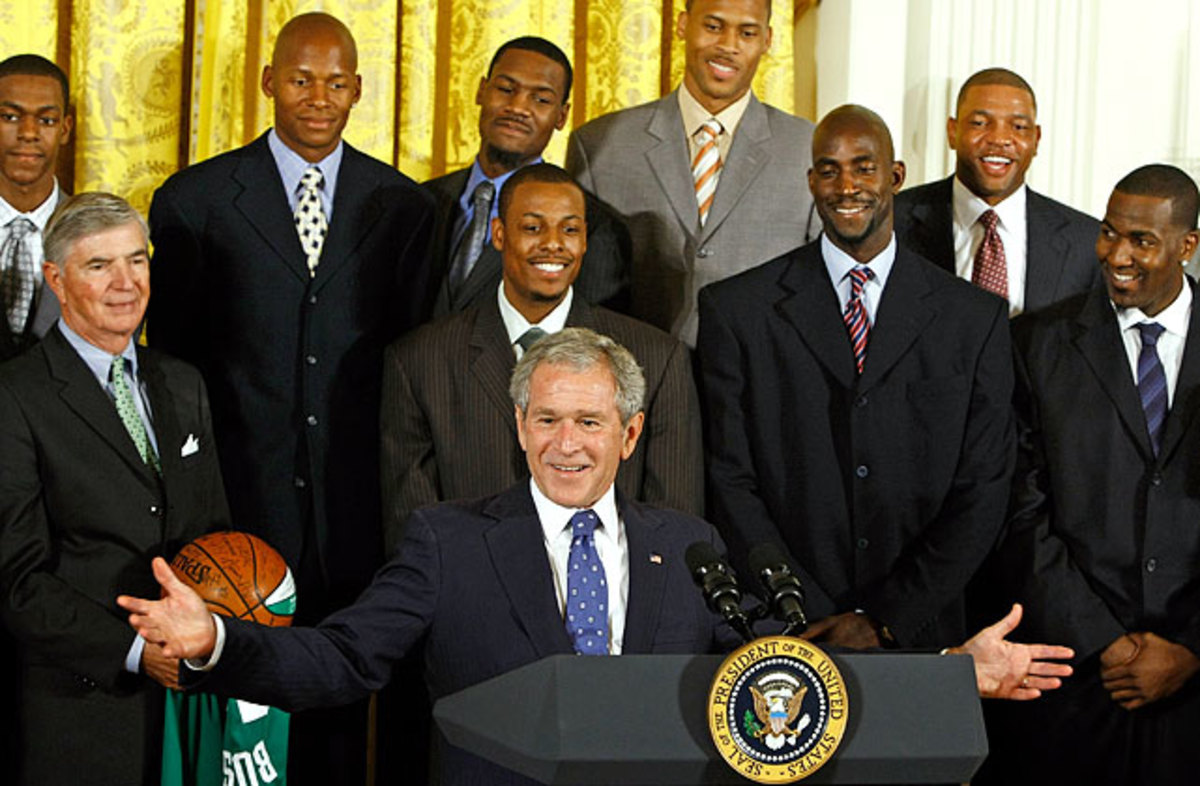
Garnett and his Celtics teammates meet President George W. Bush after winning the NBA Championship.
Peyton Manning and Kevin Garnett
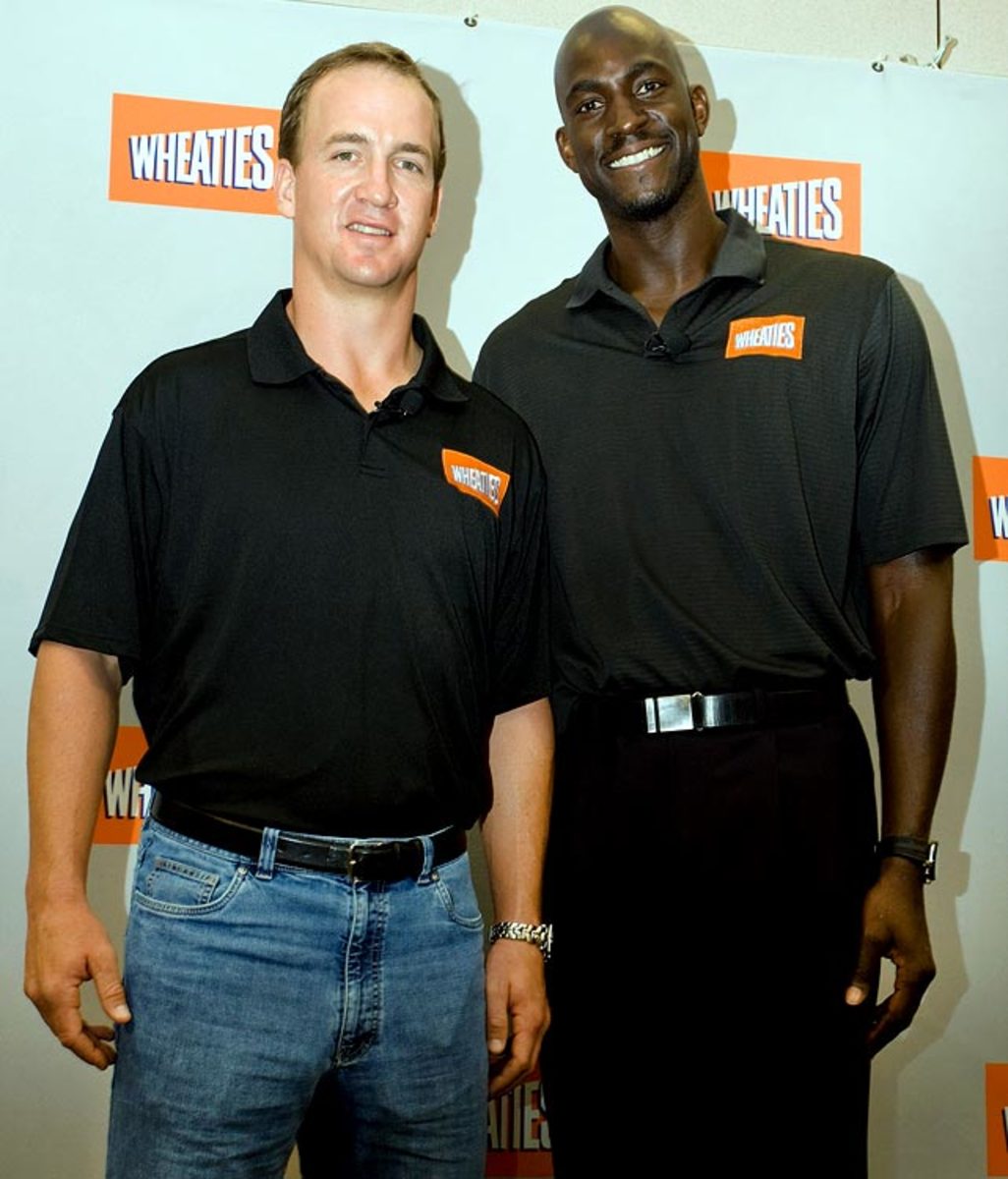
Garnett poses with then-Indianapolis Colts quarterback Peyton Manning during a promotional press conference for Wheaties.
Tim Duncan and Kevin Garnett
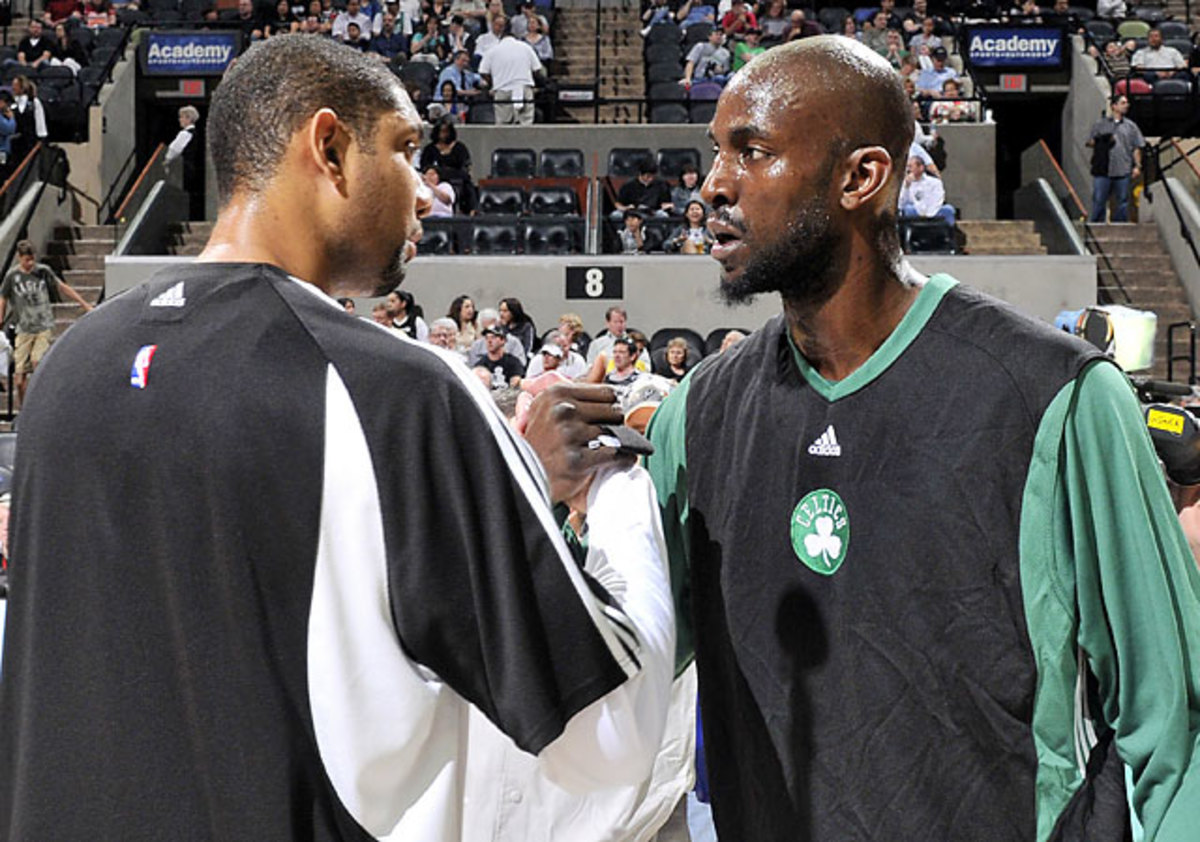
Tim Duncan (left) and Garnett shake hands before a game between the Celtics and Spurs. Garnett and Duncan have dominated the power forward position over the past decade and a half.
Kevin Garnett and LeBron James
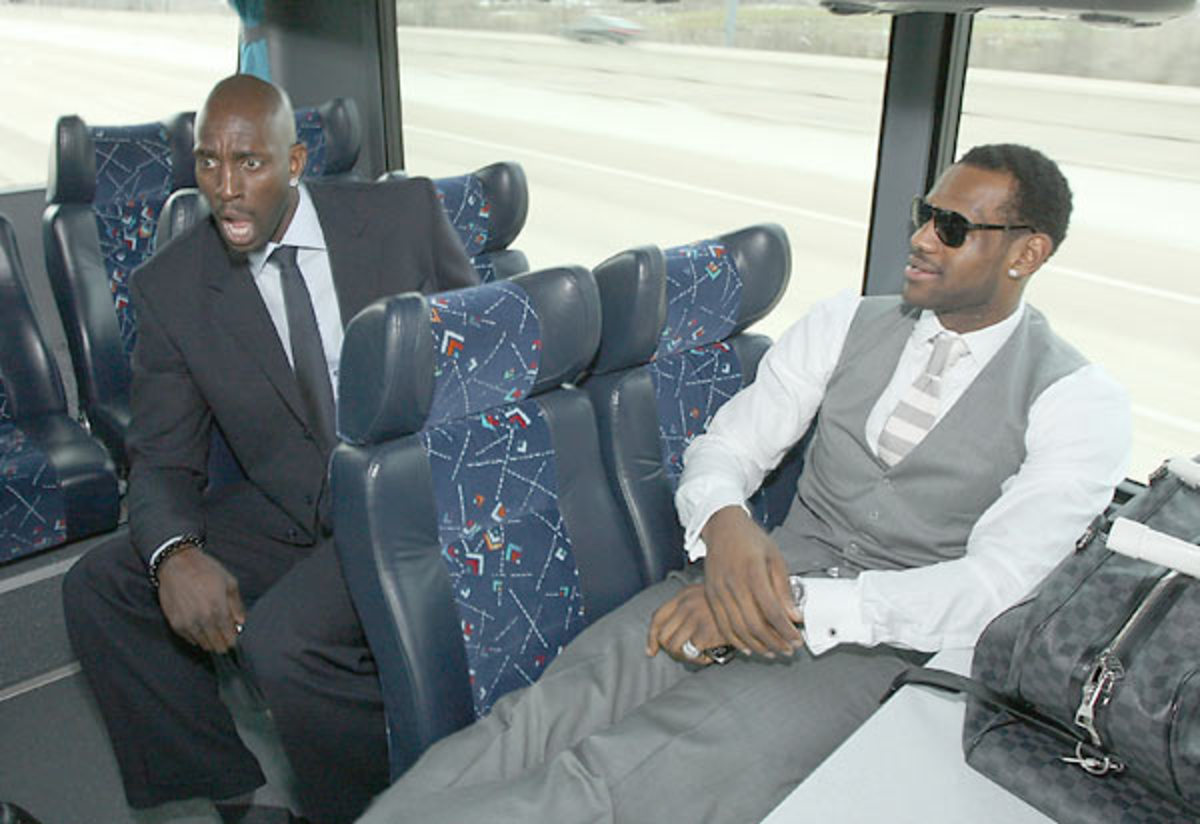
Garnett and LeBron James share a laugh on the bus ride to the stadium prior to the 2010 NBA All-Star game in Dallas.
Kevin Garnett

Garnett poses for a portrait as part of the 2011 NBA All-Star Weekend in Los Angeles.
Kevin Garnett

Garnett battles it out at the first ever Call of Duty XP at the Stages at Playa Vista in Los Angeles.
Kevin and Brandi Garnett

Garnett and his wife, Brandi, attend Day 11 of the 2011 U.S. Open.
Rajon Rondo and Kevin Garnett
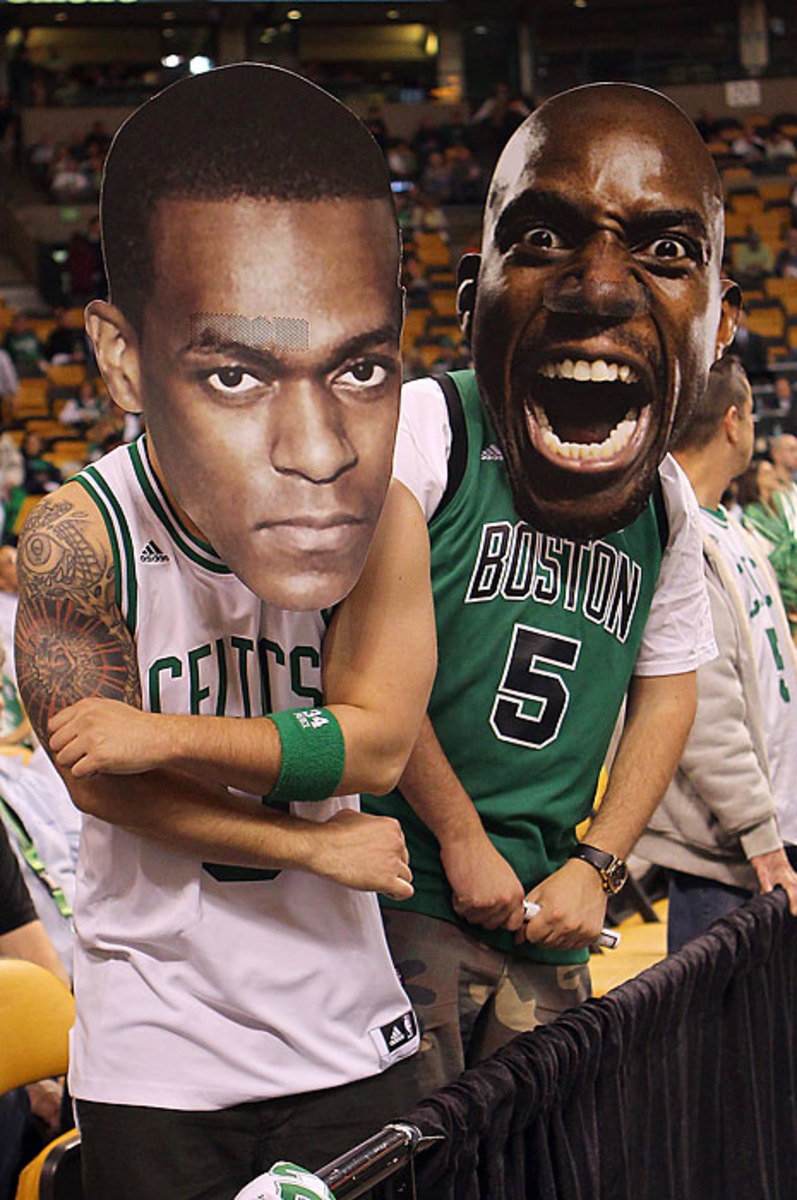
Fans wearing masks of guard Rajon Rondo and Garnett pose before a game with the Atlanta Hawks in Game 3 of the Eastern Conference quarterfinals. Garnett has adopted the city of Boston as his home since his arrival in 2007 and has become a favorite among the Celtics faithful.
Kevin Garnett and Kobe Bryant
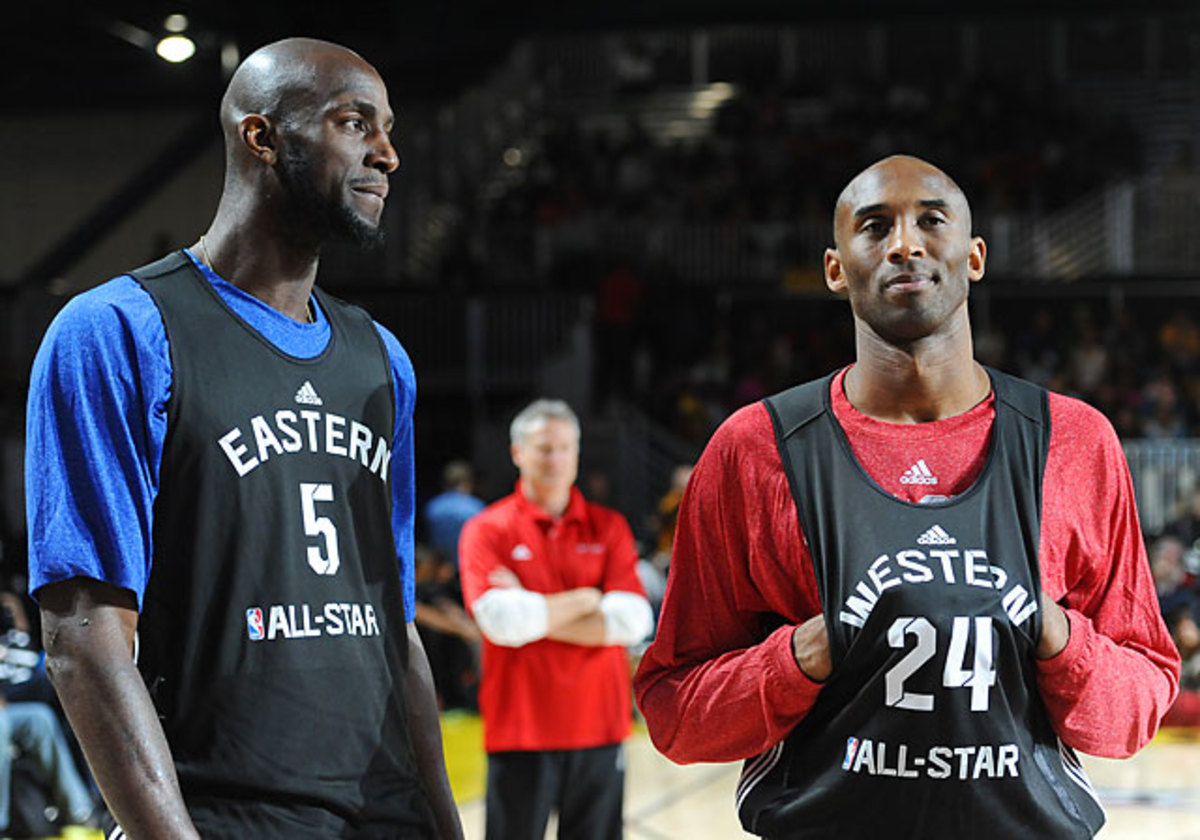
Kobe Bryant (right) and Garnett talk during the NBA All-Star practice in Houston. Garnett made 12 consecutive All-Star appearances from 2000 to 2011.
